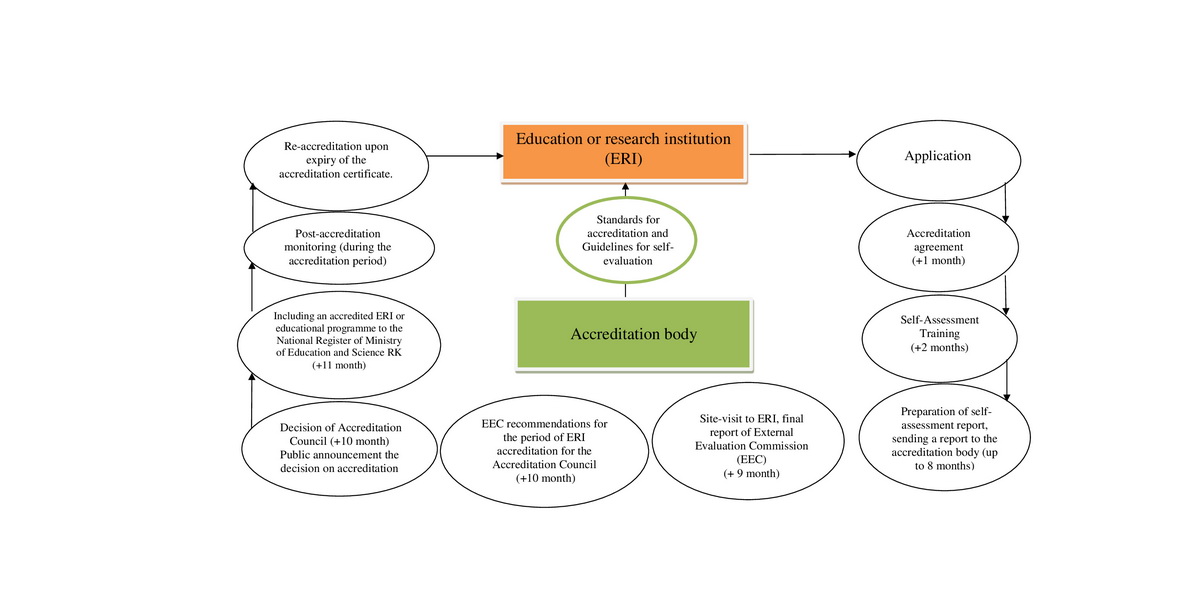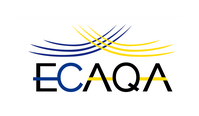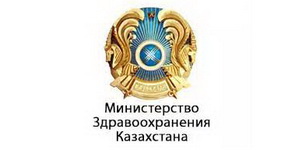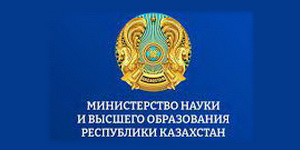About Accreditation
|
What is accreditation? |
The word "Accreditation» (Latin ad + credere) means "the trust". Accreditation is based on the application of certain Standards developed by the accreditation body considering the purpose of accreditation (institutional, specialized / programme)
If the education and research institution or the educational programme has successfully undertaken accreditation, then they receive a certificate of accreditation for a certain period (3 or 5 years), which guarantees to all stakeholders (students, faculty, employees, parents of students, representatives of employers) that this organization is providing a high quality of educational services. |
|
What is accreditation for? |
Accreditation is the recognition awarded to Higher Education Institutions and Educational programmes that meet compliance of educational services with established accreditation standards (Rules) in order to provide objective information about their quality and confirm the existence of effective mechanisms for its improvement. The Institutional and Educational programmes accreditation is the main instrument of quality assurance in education (Law of the Republic of Kazakhstan "On Education" from 7/27/2007 No. 319-III (with Amendments 4/9/2016). https://online.zakon.kz/Document/?doc_id=30118747 |
|
Is Accreditation of Higher Education Institutions for Health Professions Education carried out? |
While accrediting Higher Education Institutions for Health Professions Education, the quality of implementation in a university or college is assessed as a separate educational programme (for example, in the “Basic Medical Education” specialty from the 1st year, including internship programme), as well as, all areas of activity of Higher Education Institution are assessed. ECAQA Standards are based on the World Federation for Medical Education (WFME) Global Standards for Quality Improvement in Basic, Postgraduate Medical Education and CPD which are introduced in many countries across the world (WFME, www.wfme.org). |
|
What is important in the accreditation process? |
Accreditation bodies: legal entities that develop standards (Rules) and conduct accreditation of education institutions on the basis of standards (regulations) developed by them. Accreditation model harmonized with international practice and the Standards and Guidelines for Quality Assurance in the European Higher Education Area. https://www.enqa.eu/esg-standards-and-guidelines-for-quality-assurance-in-the-european-higher-education-area/ Accreditation ensures students with the appropriate quality of educational services Accreditation tools: Standards for institutional and specialized (programme) accreditation of higher and postgraduate education institutions, CPD providers. Standards (Rules) of accreditation: documents of the accreditation body establishing the requirements for the accreditation procedure Standards include the main criteria of international standards:
Based on these standards, the educational institution conducts a self-assessment depending on the type of accreditation - Institutional accreditation or Programme accreditation. Each Standard as a whole document consists of 20-25 pages, including another 9 to 10 standards reflecting the main areas of activity of both the educational institution and the educational programme. Thus, Standards for Institutional Accreditation of Higher Education Institutions for Health Professions Education includes 9 Standards, e.g., Standard 1 "Mission and Outcomes", Standard 4 "Students" and Standard 6 "Educational Resources", etc. STANDARDS for Institutional accreditation of non-medical Higher Education Institutions and TVET organisations include10 main standards
|
|
How accreditation is documented as a process? |
• The Law on Education, Article 9.1 is devoted to accreditation as one of the most important tools for improving the quality of educational services. https://online.zakon.kz/Document/?doc_id=30118747#pos=1249;-56. This task is included in the State Program for the Development of Education of the Republic of Kazakhstan for 2020-2025. https://www.gov.kz/memleket/entities/edu/press/article/details/20392?lang=ru, Code of the Republic of Kazakhstan on Citizen’s well-being and health care system (2021) https://online.zakon.kz/Document/?doc_id=34464437, Accreditation can be carried out by national and international accreditation bodies based on the standards developed by them. The Ministry of Education and Science of the Republic of Kazakhstan forms the National Register 1 of accreditation bodies recognized in Kazakhstan
There are two types of accreditation: Institutional accreditation - reviewing academic and organizational structures of Higher Education Institution as a whole. Programme accreditation - conducting an in-depth assessment of educational programmes at the Higher Education Institution. Education institutions that have undergone institutional and / or specialized accreditation have right to issue personal diplomas under an accredited programme and carry out placement by the state order for the students’ admission. |
|
Why is institutional and specialized accreditation important? |
According to agreement between the countries of the Eurasian Economic Union and the CIS countries the mutual recognition of diplomas of higher and post-secondary educational institutions is carried out only for graduates of accredited higher education institutions and colleges Advocacy for education abroad and on the international labor market of citizens of Kazakhstan - according to international requirements, a higher educational institution must be accredited in its country, otherwise even state standard and other diplomas are not recognized abroad(www.akorda.kz/ru/official_documents, https://e.edu.kz/68) Integration of the system of higher and postgraduate education of Kazakhstan into the international educational space and the implementation of the basic parameters of the Bologna process (In March 2010, Kazakhstan officially joined the Bologna Declaration and became the 47th member of the European Higher Education Area and the first Central Asian country that is recognized as a full member of the European Education Area, http://www.naric.kz) Collaboration with international education quality networks to information exchange and develop comparable criteria and procedures (www.enqa.eu, www.inqaahe.org, www.apqn.org , etc.) |
|
A large number of foreign students study at higher education institutions in Kazakhstan. Most of them return to their home countries and those countries are interested in young professionals, physicians having relevant competencies and qualifications For instance, the Educational Commission for Foreign Medical Graduates issued a statement: The Educational Commission for Foreign Medical Graduates/ECFMG, https://www.ecfmg.org/accreditation/) determined that in 2024, applicants applying to this commission will be required to complete their studies at an accredited medical school. To meet these requirements, the medical school must be accredited with the accreditation procedure which uses criteria compatible with the Liaison Committee on Medical Education/LCME for USA medical schools or with other criteria internationally accepted and approved such as the World Federation for Medical Education/WFME. |
|
|
Do students participate in accreditation? |
Students actively participate in the self-assessment process of the education institution and educational programme, as well as in external review. Please, follow the link for more information http://www.ecaqa.org/kz/studentter/studentterdin-akkreditteuge-katysuy http://www.ecaqa.org/studenty/uchastie-studentov-v-akkreditatsii http://www.ecaqa.org/en/students/students-involvement For instance in Standard 4 «Students» (for HEI of Health Professions Education and nursing colleges) or Standard 3 «Student centered learning and students assessment» (for non-medical HEIs and colleges) contain the criteria for the policy of students’ admission, selection and enrollment, advisory and social support for students and student representatives in various management bodies and advisory unions. Students are often involved to describe this standard by representatives of the education institution (HEI, college), who assist to objectively and precisely present necessary information for the self-assessment report. While preparing a self-assessment report, the HEI involves representatives of student government to collect, examine and analyze relevant data and identify issues that need to be addressed and identify measures to improve standards At the stage of conducting a self-assessment, the leadership and the representative of the education institution meet with student government. At the meeting with the student government, the role and participation of students in the institutional or specialized self-assessment process should be defined and discussed. Usually, a group of students is formed, responsible for conducting an independent student analysis. The result of the self-assessment process is the report of the education institution, which is submitted to the accreditation body for review. The site-visit program of External Experts Commission must include the meeting with HEI or college students http://www.ecaqa.org/vneshnyaya-ekspertnaya-komissiya, http://www.ecaqa.org/en/the-external-expert-commission, http://www.ecaqa.org/kz/syrtky-sarapshylyk-komissiya (master’s degree, PhD, trainees) and includes a questionnaire, which allows to identify the strengths and issues of the education institution. By objectively answering the questions of the accreditation body's questionnaire, you can provide significant assistance to your Alma Mater in improving educational programmes. Students of other educational institutions participate in the work of the External Expert Commission of the accreditation body as experts with the right to vote. Student-experts, as a rule, pay great attention to interviews with students of the accrediting education institution regarding issues of providing students with necessary resources (literature, office equipment, Internet, faculty members, classrooms, etc.), access to patients in clinics, involvement in research, participation in conferences and publications, communication with faculty, issues of social support and student counselling. The information obtained through this assessment is used to review these goals and services, as well as to improve their achievement. |
|
What are the stages of the accreditation process and in which stages of accreditation students take part? |
The stages of accreditation (see the diagram below) Submission of the application form to the accreditation body; The admission of the education and research institution to accreditation; Self-assessment by the education and research institution; Site-visit of the education and research institution by External Evaluation Commission; Decision on accreditation; Post-accreditation monitoring http://www.ecaqa.org/kz/akkreditteu/akkredittewden-keyingi-baq-law, http://www.ecaqa.org/postakkreditatsionnyy-monitoring, http://www.ecaqa.org/en/post-accreditation-monitoring; Re-accreditation upon expiry of the accreditation certificate.http://www.ecaqa.org/akkreditatsiya/protses-akkreditatsii http://www.ecaqa.org/en/accreditation-process-and-procedures |









